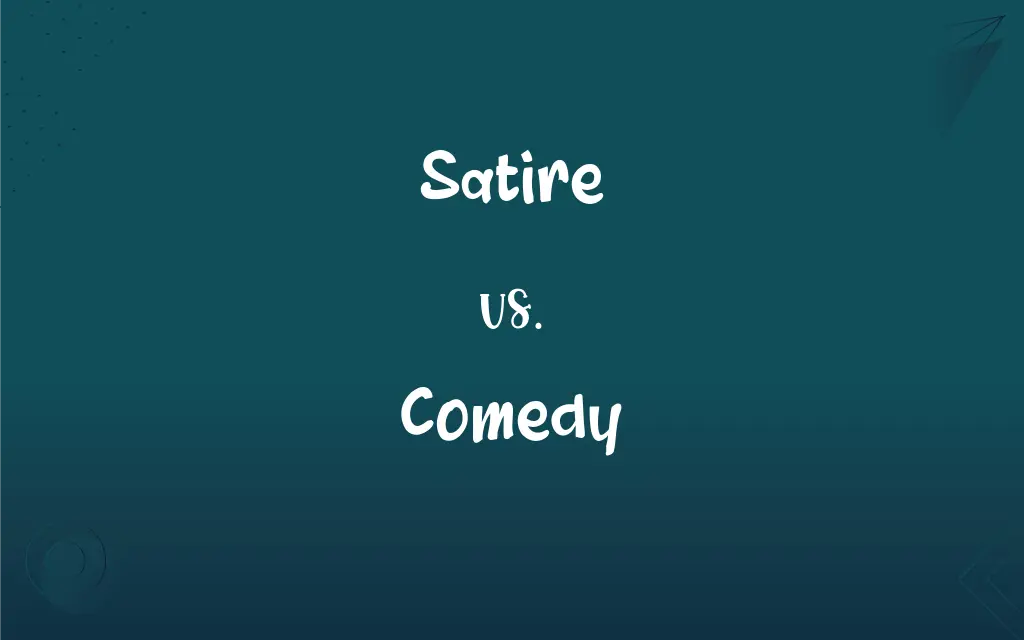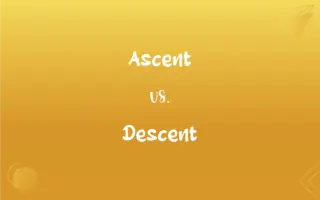Satire vs. Comedy: What's the Difference?
Edited by Harlon Moss || By Janet White || Updated on October 30, 2023
Satire uses humor, irony, or exaggeration to expose flaws, while comedy is a genre aimed at amusing and entertaining.

Key Differences
Satire and comedy are both forms of expression intended to draw laughter, but they serve different purposes. Satire employs humor, irony, or ridicule to criticize or mock people, politics, or society in general, thus exposing and discrediting folly or vice. In contrast, comedy is a broader genre, encompassing various sub-genres, focusing on humor to evoke laughter, amusement, and entertainment, often without the intention to convey a deeper societal or moral critique.
Satire seeks to provoke thought and reflection on societal issues, employing wit and sharpness to expose flaws and provoke change. Conversely, comedy primarily centers on eliciting laughter and joy, often highlighting human quirks and amusing situations but not necessarily seeking to drive social or individual reform.
While satire is inherently comedic, aiming to amuse while simultaneously enlightening its audience to inconsistencies or absurdities in society, comedy doesn’t inherently contain a satirical element. Comedy can simply exist to provide amusement, focusing on timing, situation, and character to create humor, without delving into societal critique.
The foundations of satire are entrenched in a keen observation of the human condition and societal norms, using humor as a tool to magnify and dissect human and societal shortcomings. On the other hand, comedy explores a myriad of human experiences and interactions, concentrating on the humor inherent in everyday life without necessarily incorporating critical observation or commentary.
In essence, satire is a specialized form of comedy that seeks to effectuate change by exposing the flaws it observes, and it relies heavily on intellectual engagement from the audience. Comedy, in its multifarious forms, revolves around the universal human experience of laughter, often presenting an escape from reality and a way to view the lighter side of life.
ADVERTISEMENT
Comparison Chart
Purpose
To criticize and expose flaws using humor, irony, or exaggeration.
To amuse and entertain.
Focus
On societal, political, or individual flaws and inconsistencies.
On humor arising from situations, characters, and timing.
Intention
To provoke thought, reflection, and possibly change.
To elicit laughter and joy.
Scope
More specialized, with an emphasis on critique and intellectual engagement.
Broader, encompassing various sub-genres and styles.
Audience Engagement
Requires intellectual engagement and reflection.
Primarily seeks to evoke laughter and amusement.
ADVERTISEMENT
Satire and Comedy Definitions
Satire
Satire is humor, irony, or exaggeration used to expose and criticize people’s stupidity or vices.
Jonathan Swift’s “A Modest Proposal” is a satire suggesting eating children as a solution to overpopulation.
Comedy
Comedy often involves exaggerated characters and situations to elicit laughter.
“The Office” is a comedy series featuring exaggerated characters in a workplace setting.
Satire
Satire seeks to effect change by shaming individuals, corporations, government, or society itself into improvement.
“Saturday Night Live” often uses satire to mock political figures and current events.
Comedy
Comedy is a form of entertainment intended to be humorous, providing amusement and laughter.
Stand-up comedy performances involve comedians making audiences laugh with humorous anecdotes and observations.
Satire
Satire is a literary form that uses irony, wit, and ridicule to criticize and mock.
“Animal Farm” by George Orwell is a satire on the Russian Revolution.
Comedy
Comedy is a genre of film, play, or other art forms aimed at making an audience laugh.
“Dumb and Dumber” is a comedy film known for its slapstick humor.
Satire
Satire employs sharp humor or irony to bring about awareness of societal or individual flaws.
“The Onion” publishes satirical articles that mock and exaggerate current news stories.
Comedy
Comedy often depicts the amusing aspect of everyday situations.
Sitcoms like “Friends” are examples of comedy based on everyday scenarios.
Satire
A literary work in which human foolishness or vice is attacked through irony, derision, or wit.
Comedy
Comedy can encompass various sub-genres, each aiming to evoke laughter and amusement.
“Monty Python and the Holy Grail” is a comedy film that employs absurd and surreal humor.
Satire
The branch of literature constituting such works.
Comedy
A dramatic work that is light and often humorous or satirical in tone and that usually contains a happy resolution of the thematic conflict.
Satire
Irony, sarcasm, or caustic wit used to attack or expose human foolishness or vice.
Comedy
The genre made up of such works.
Satire
(uncountable) A literary device of writing or art which principally ridicules its subject often as an intended means of provoking or preventing change or highlighting a shortcoming in the work of another. Humor, irony, and exaggeration are often used to aid this.
Comedy
A literary or cinematic work of a comic nature or that uses the themes or methods of comedy.
Satire
(countable) A satirical work.
A stinging satire of American politics.
Comedy
Popular entertainment composed of jokes, satire, or humorous performance.
Satire
Severity of remark.
Comedy
The art of composing or performing comedy.
Satire
A composition, generally poetical, holding up vice or folly to reprobation; a keen or severe exposure of what in public or private morals deserves rebuke; an invective poem; as, the Satires of Juvenal.
Comedy
A humorous element of life or literature
The human comedy of political campaigns.
Satire
Keeness and severity of remark; caustic exposure to reprobation; trenchant wit; sarcasm.
Comedy
A humorous occurrence.
Satire
Witty language used to convey insults or scorn;
He used sarcasm to upset his opponent
Irony is wasted on the stupid
Satire is a sort of glass, wherein beholders do generally discover everybody's face but their own
Comedy
A choric song of celebration or revel, especially in Ancient Greece.
Satire
Satire leverages exaggeration and contrasts to highlight the folly and inconsistency in the subject matter.
“Dr. Strangelove” is a film that uses satire to comment on the nuclear arms race.
Comedy
(countable) A light, amusing play with a happy ending.
Comedy
A narrative poem with an agreeable ending (e.g., The Divine Comedy).
Comedy
A dramatic work that is light and humorous or satirical in tone.
Comedy
(drama) The genre of such works.
Comedy
(uncountable) Entertainment composed of jokes, satire, or humorous performance.
Why would you be watching comedy when there are kids starving right now?
Comedy
The art of composing comedy.
Comedy
(countable) A humorous event.
Comedy
A dramatic composition, or representation of a bright and amusing character, based upon the foibles of individuals, the manners of society, or the ludicrous events or accidents of life; a play in which mirth predominates and the termination of the plot is happy; - opposed to tragedy.
With all the vivacity of comedy.
Are come to play a pleasant comedy.
Comedy
Light and humorous drama with a happy ending
Comedy
A comic incident or series of incidents
FAQs
Can comedy be a form of social critique?
While comedy can be used to critique society, it isn’t an inherent aspect of it, unlike satire which inherently critiques.
What is the main purpose of satire?
The main purpose of satire is to use humor, irony, or exaggeration to expose and criticize people’s stupidity or vices, ideally leading to reflection and change.
Is satire always political?
While often political, satire can address a range of topics, including societal norms, individuals, and cultural phenomena.
How does audience engagement differ between satire and comedy?
Satire typically requires intellectual engagement and reflection on societal flaws, while comedy primarily seeks to evoke laughter and amusement.
Is irony essential in comedy?
Irony can be a tool in comedy, but it’s not essential; comedy has a vast array of techniques and styles.
Can satire be found within comedy?
Yes, satire is often considered a form of comedy as it uses humor to critique and expose flaws and inconsistencies.
Can satire be a form of entertainment?
Absolutely, satire can entertain while also provoking thought and reflection on the subject matter it critiques.
Is comedy always meant to be funny?
Comedy primarily aims to be funny and amusing, focusing on eliciting laughter and joy from the audience.
How does satire use exaggeration?
Satire uses exaggeration to magnify flaws, making them more visible and ridiculous, encouraging reflection and acknowledgment.
Does satire always aim to effectuate change?
While satire often aims to effect change by highlighting flaws and inconsistencies, the extent to which it seeks change can vary.
Does comedy always involve exaggerated situations and characters?
Often, comedy involves exaggeration as a technique to elicit laughter, but it isn’t a mandatory element.
Can comedy exist without a humorous element?
Comedy inherently involves humor, as its primary goal is to evoke laughter and amusement from the audience.
Can comedy be satirical?
Yes, comedy can be satirical when it uses humor to expose and critique societal and individual flaws.
Can a comedy be intellectual and thought-provoking?
Absolutely, some comedies are intellectual and prompt reflection, exploring deeper themes through humor.
How important is wit in satire?
Wit is crucial in satire as it sharpens the critique and enhances the humor, making the satire more effective and engaging.
About Author
Written by
Janet WhiteJanet White has been an esteemed writer and blogger for Difference Wiki. Holding a Master's degree in Science and Medical Journalism from the prestigious Boston University, she has consistently demonstrated her expertise and passion for her field. When she's not immersed in her work, Janet relishes her time exercising, delving into a good book, and cherishing moments with friends and family.
Edited by
Harlon MossHarlon is a seasoned quality moderator and accomplished content writer for Difference Wiki. An alumnus of the prestigious University of California, he earned his degree in Computer Science. Leveraging his academic background, Harlon brings a meticulous and informed perspective to his work, ensuring content accuracy and excellence.































































